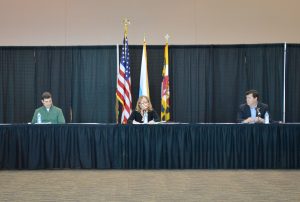
OCEAN CITY – A discussion on broadband infrastructure, hospitality challenges and education funding highlighted a roundtable discussion last week with Maryland Senate Minority Leader Bryan Simonaire.
On Dec. 11, State Senator Mary Beth Carozza hosted a roundtable discussion with special guests Simonaire and State Senator Doug Peters to hear about Worcester County’s challenges and priorities.
“I thought this would be an outstanding opportunity for you to basically show off District 38, show off Ocean City and all of Worcester County,” she told local leaders last week. “This is our opportunity to shine.”
Ocean City Mayor Rick Meehan told Simonaire and Peters last week the resort’s priorities included the introduction of state legislation requiring third-party rental platforms – such as Airbnb, Vrbo and HomeAway – to pay state sales tax and county room tax. He said Ocean City and jurisdictions around the state continued to lose millions in uncollected revenue each year.
“Locally, we have no way to require payments of those taxes,” he said. “We’d have no way to enforce such as requirement. What we can do, and what we do, is enforce that requirement for our brick-and-mortar companies and our hotels and motels and all rental properties located here in Ocean City. This on its own has created an uneven playing field for our local businesses.”
Ocean Pines Association President Larry Perrone also highlighted his community’s priorities for the coming year. In addition to funding for drainage system improvements, he noted that the association was also seeking improvements to Route 589.
“We believe it has gotten to a point where this is a safety issue,” he said.
Those in the tourism and hospitality industries also outlined their top priorities and issues to state leaders last week.
Worcester County Tourism Director Melanie Pursel noted that the county continued to focus on business retention, the development of a state-of-the-art sports complex, and the need for broadband infrastructure, among other things.
“If we don’t have connectivity, we cannot grow,” she said.
Ashley Harrison, vice president of operations for The Harrison Group, told state leaders last week labor shortages and minimum wage increases continued to plague local hoteliers and restauranteurs. She asked legislators to keep the minimum wage at $11 an hour through the end of 2021.
“This upcoming summer small business owners everywhere across the state are going to face a strong headwind without the rising minimum wage,” she said.
Ocean City Hotel-Motel-Restaurant Association Executive Director Susan Jones told officials last week the hospitality industry was one of the hardest-hit sectors during the COVID-19 pandemic. She said the introduction of a Maryland tourism tax credit could help.
“It would be a way to help Marylanders travel throughout Maryland,” she said. “We think if we can fuel tourism and really push people to travel, we can keep travel within our state and we can keep the tax dollars in our state.”
Worcester County Health Officer Rebecca Jones provided representatives last week with an update on the county’s COVID-19 testing efforts and vaccination plans. She was joined by Atlantic General Hospital President and CEO Michael Franklin, who highlighted challenges associated with high-deductible health plans and telemedicine access in rural communities.
Worcester County Public Schools Superintendent Lou Taylor also underscored the area’s technology issues.
“Broadband infrastructure is paramount if we are going to continue to have issues such as this pandemic …,” he said. “Technology is the thing for our school systems now, and we have to be able to provide not only for our kids but for our teaching staff as well.”
Taylor also noted that 43% of Worcester County students lived in households of poverty, but its school system received the least amount of state funding. He encouraged state leaders to review the Maryland’s school funding formula.
“I would ask if that ever comes across your desk that you would take a look at that, to move us forward as well,” he said.
State leaders last week also heard reports from the Ocean City Police Department, the Maryland Coastal Bays Program and the Greater Ocean City Chamber of Commerce, among other local agencies, before attending another roundtable meeting with officials in Wicomico County. For his part, Simonaire thanked local leaders for their input.
“It was very informative,” he said, “and you have given me a lot of information to bring back to Annapolis.”
Peters, chair of the state’s Capital Budget Subcommittee, also took the time to outline the state’s funding challenges in 2021.
“Operating money is going to be very, very difficult to come by,” he said. “If you get what you have last year, you are in good shape.”
However, Peters encouraged local leaders to pursue funding for capital projects, including broadband infrastructure and Route 589 improvements.
“That’s something you need to go for right away,” he said.

